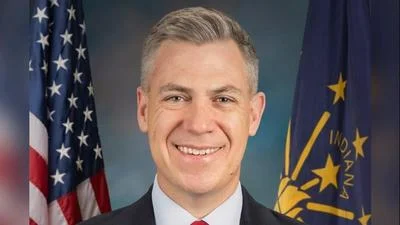Rep. Marlin Stutzman, a U.S. Congressman from Indiana, posted several statements on November 15, 2025, criticizing members of the Indiana Senate and Democratic lawmakers over recent legislative actions and political stances.
In a post made at 01:17 UTC, Stutzman stated: "Senator Bray and anti-Trump Indiana Senate Republicans made it clear today that they would rather protect André Carson, stand with Pete Buttigieg, and let Gavin Newsom steamroll Hoosier voices than support the conservative America First agenda. I am calling on the Senate to https://t.co/C30ruP6rFk".
Later that day at 14:39 UTC, he continued his criticism of state legislators by posting: "Indiana Senate Republicans against redistricting - how can you see this post and still think you are serving the constituents who voted for you? Trump won Indiana by nearly 20 points almost one year ago to date, and still you are choosing to help the Democrat Socialists instead https://t.co/B0NLb3gxOa".
At 18:06 UTC on November 15, Stutzman addressed delays in government proceedings attributed to Democrats: "Democrats stalled for 43 days, keeping the government in limbo while Americans paid the price. We’re ready to move forward and make up for the time they wasted. https://t.co/rJMuPLTm3h".
The comments from Rep. Stutzman come amid ongoing debates within Indiana's legislature regarding redistricting proposals and party alignment. Redistricting has been a contentious issue in many states following each decennial census as lawmakers determine new legislative boundaries—a process often influenced by partisan interests.
Donald Trump won Indiana by a significant margin in the 2024 presidential election; according to certified results reported by state officials, Trump carried Indiana by nearly twenty percentage points over his opponent. This result has fueled ongoing discussions among Republican leaders about representing their voter base's preferences in legislative decisions.
Government funding debates have also led to temporary stalemates at both federal and state levels in recent years. Such impasses can disrupt public services until agreements are reached between parties.




 Alerts Sign-up
Alerts Sign-up